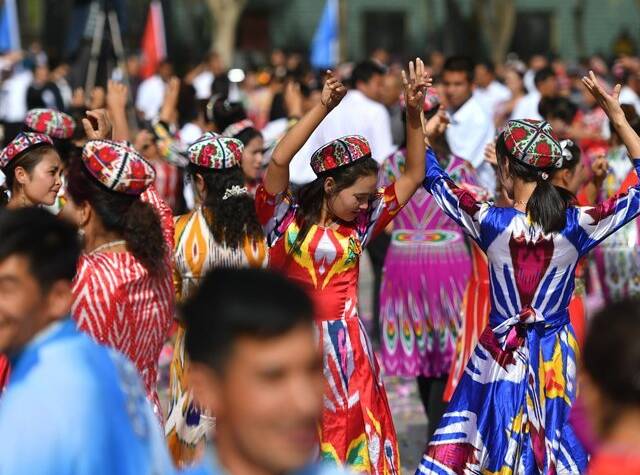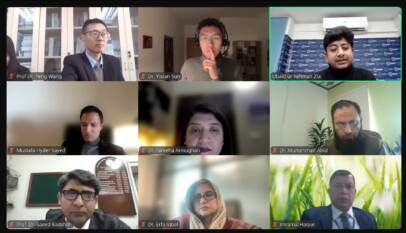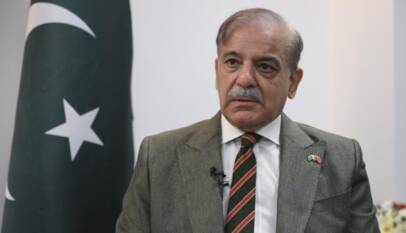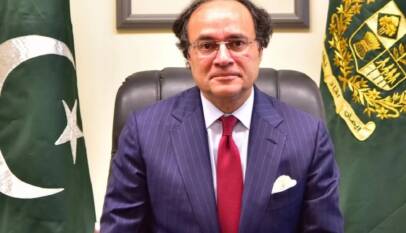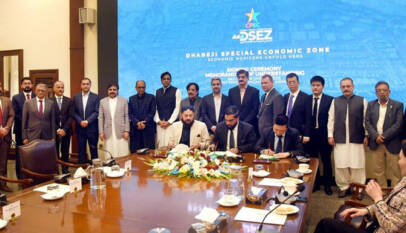Pakistan supports China’s efforts for ‘peace, stability’ in Xinjiang:FO
Pakistan supports China’s efforts for socio-economic development, harmony and peace and stability in Xinjiang, the Ministry of Foreign Affairs said after the release of the Office of High Commissioner for Human Rights (OHCHR) report on human rights in Xinjiang. In response to media queries, the foreign affairs spokesperson said that Pakistan, as a responsible member of the United Nations, believed “in the principles of the UN Charter including respect for political independence, sovereignty and non-interference in internal affairs of states”.
Pakistan on Tuesday said it supports China’s efforts for socio-economic development, harmony and peace, and stability in Xinjiang, days after the United Nations released a report detailing a string of alleged rights violations against Uighurs and other minorities in the region.
The UN on Sep 1 released a major report into the alleged serious human rights abuses in Xinjiang region, saying torture allegations were credible and citing possible crimes against humanity, but stopping short of calling it genocide.
The long-awaited report brought the UN seal to many of the allegations long brought by activist groups, Western nations and the Uighur community in exile.
“The extent of arbitrary and discriminatory detention of members of Uighur and other predominantly Muslim groups … may constitute international crimes, in particular crimes against humanity,” the report had said.
It said the world must now pay “urgent attention” to the human rights situation in Xinjiang.
However, reacting to the report, the Foreign Office issued a statement today, saying: “Pakistan believes in the principles of the UN Charter including respect for political independence, sovereignty and non-interference in internal affairs of states.”
The FO said it was Pakistan’s consistent position that non-politicisation, universality, objectivity, dialogue and constructive engagement should be the main tools to promote universal respect for human rights.
It underlined that China had succeeded in lifting over 700 million people out of poverty in the last 35 years, thus improving their living conditions and the enjoyment of fundamental human rights.
“We appreciate China’s constructive engagement with the UN human rights system as well as the OIC General Secretariat, as evidenced by visits of the former High Commissioner for Human Rights and OIC delegation to China,” it added.
The statement added that Pakistan reaffirmed its abiding commitment to advance all human rights universally in accordance with the principles of the UN Charter.
The UN report was in the making for around a year and its release was bitterly opposed by China.
Torture allegations ‘credible’
China has been accused for years of detaining more than one million Uighurs and other Muslims in the region.
Beijing has vehemently rejected the claims, insisting it is running vocational centres designed to curb extremism.
“Serious human rights violations have been committed in XUAR in the context of the government’s application of counter-terrorism and counter-‘extremism’ strategies,” the UN report said.
The assessment raised concerns about the treatment of people held in China’s so-called “Vocational Education and Training Centres” (VETCs).
“Allegations of patterns of torture or ill-treatment, including forced medical treatment and adverse conditions of detention, are credible, as are allegations of individual incidents of sexual and gender-based violence,” the report said.
The UN Human Rights Office could not confirm how many people were affected by the VETCs but concluded that the system operated on a “wide scale” across the entire region.
The number in the VETCs, at least between 2017 and 2019, “was very significant, comprising a substantial proportion of the Uighur and other predominantly Muslim minority populations”.
Campaigners have accused China of forcibly sterilising women, and the report cited “credible indications of violations of reproductive rights through the coercive enforcement of family planning policies”.
‘Disinformation and lies’
China’s mission in Geneva hit out at the report and maintained its firm opposition to its release, sharing a 121-page document from the Xinjiang provincial government defending Beijing’s policies in the region.
“Based on the disinformation and lies fabricated by anti-China forces and out of the presumption of guilt, the so-called ‘assessment’ distorts China’s laws and policies, and wantonly smears and slanders China, and interferes in China’s internal affairs,” it said.
“People of all ethnic groups in Xinjiang are living a happy life in peace and contentment. It is the greatest human rights protection and the best human rights practice.”
Non-governmental organisations and campaign groups said the report should act as a launchpad for further action.
Human Rights Watch’s China director Sophie Richardson said the “damning” findings of sweeping rights abuses showed why Beijing “fought tooth and nail” to prevent its publication.
The response from the Uighur activist community was mixed, with some groups praising its work while others wishing it had gone further in its condemnation of Beijing’s actions in Xinjiang.
“This is a game-changer for the international response to the Uighur crisis,” said Uighur Human Rights Project executive director Omer Kanat.
“Despite the Chinese government’s strenuous denials, the UN has now officially recognised that horrific crimes are occurring.”
And World Uighur Congress president Dolkun Isa said the report paved the way for “meaningful and tangible action” by countries, businesses and the UN, adding: “Accountability starts now.”
But Salih Hudayar, a Uighur-American who campaigns for Xinjiang independence, told AFP the report was “sadly not as strong as we had hoped”.
“Our people have been waiting years for the UN to speak out,” said Hudayar.
“Unfortunately, because of Chinese government pressure, the UN has long remained silent.”
Experts highlight green SEZs under CPEC for sustainable development
ISLAMABAD – The experts on Monday emphasised the significance of enhanced collabor…



